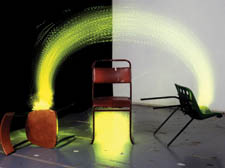|
|
 |
| |

A séance being conducted with ectoplasm from nose leading to coat-hanger spirit |
Death knell sounds for home of supernatural
The world’s largest collection of paranormal literature looks destined to disappear into the ether, writes Elinor Zuke
IN a restricted-access room in a dark London tower there is, according to some, proof that ghosts exist.
Senate House is best known as the University of London’s library, but the collections in the capital’s first skyscraper extend far beyond obligatory reading lists and dusty journals.
The Harry Price Library of Magical Literature is one man’s extraordinary collection of the paranormal and beyond.
Price’s interest started with a magic show at a fair, aged eight, and today the collection holds almost 13,000 books, pamphlets and photos.
He believed in the supernatural, dedicating his life to investigating and collecting literature relating to haunted houses, poltergeists and possession. But he was also determined to catalogue the hoaxes that might put people off – hence the inclusion of a fake hand used to forge ghostly knocks at a séance table and a marked pack of cards.
Price bequeathed his collection to Senate House when he died in 1948, leaving the largest- known collection of magical literature.
“Apart from its bibliographical and historical interest,” Price wrote about his collection, “the main purpose of the Research Library is to assist students in the investigation of alleged phenomenological happenings; to help them detect the psychic imposter and charlatan, and to enable them to recognise genuine phenomenon, if and when he sees one.”
But the attraction reaches further than exorcists and wizards.
“The collection has a very wide interest,” says Christine Wise, head of special collections at Senate House Library.
“Some of the material about witchcraft is now very relevant to areas such as gender studies and how women have been portrayed over time.”
“I don’t think people realise how important this collection is or how broad it is,” adds Price’s most recent biographer, Richard Morris.
“It contains a huge amount of social history from the early 17th century through to the mid-20th, and all under one roof. There are letters from Conan Doyle and Houdini to Price, plus many more from well known names.
“There is nothing like it in the entire world, that’s for certain. It should be more highly valued by researchers, academics and social historians. Senate House is perfectly situated at the heart of Bloomsbury. What more could Price have wished for?”
But few outside the academic community and occult aficionados are aware of Harry Price’s collection – and time is running out to explore it.
A funding review by the Higher Education Funding Council of England – the body in charge of distributing the government’s higher education budget – recently slashed £1m from the library’s budget.
And with the library already losing £1m each year, the colleges that make up the University have commissioned a review into the services at Senate House Library.
The review is based on an acceptance that current funding levels can not sustain all the services the library provides.
It will explore all options, including splitting up its collections to free up space for renting, and closing the library entirely.
John Fielden, who heads CHEMS, the consultancy carrying out the review, admits that splitting up and selling off collections including Price’s is another consideration.
The heads of colleges will decide whether to stump up the £2m required to maintain current provisions or scale back in November.
Students are deeply concerned about the implicit threats to their reading lists. Philosophy students at UCL complain that their college’s library doesn’t have the texts they are required to read, while Save Senate House Library campaigner Peter Brett points out that if the collections are broken up, it could force each college to purchase rare books, costing them more in the long run.
Students are lobbying their colleges to increase their financial contributions to Senate House Library. Their principals and vice-chancellors must at least politely listen to their pleas.
But what about users of the Harry Price collection and its fellow unusual and specialist collections? For example, a growing collection of every Terry Pratchett book ever published – in 37 languages to date – and the further 58 special collections and 1,100 rare archives that lie with Price’s porcelain hands in Senate House’s towers. No one has written a PhD on Pratchett’s work yet, but it’s only a matter of time. And what could happen to residents in Camden and beyond who can currently sign up for membership?
One option the review will be looking at is expanding membership to universities in London outside the federation. An agreement with Camden could be another option.
David Pearson, Director of Library Services, said: “If there was a body in Camden that wanted to come to the University and say ‘We’d like [the library] to be made more freely and easily available to the citizens of Camden and we’ll come to some kind of financial arrangement with the University so anyone from Camden can use it as a public library,’ we’d be happy to enter into those kinds of discussions.
“I can see that perhaps this is not very likely, but people from Camden or the Camden community can again lobby the colleges of the University and say, ‘Look, we want this resource to continue to be on our doorstep, and we want you to pay for it.’
“In the cold hard world we live in there’s always a financial side to providing a service. We’re very happy to provide it, but we can’t do it for free”. |

|
 |
| |
Your comments:
It would have been helpful for the author to have included the contact details of the consultancy firm undertaking the review of SHL so that interested members of the local community in Camden could contribute their views to the consultation.
Hilary Canavan |
| |
|
 |
|

